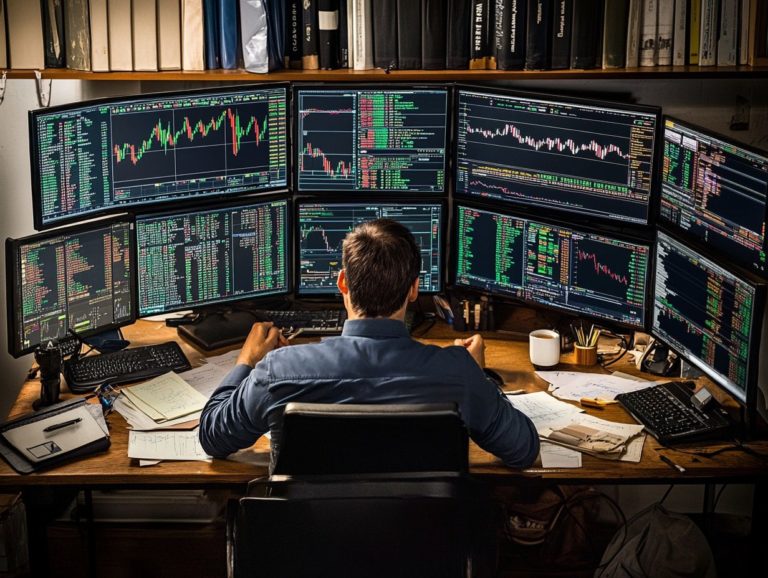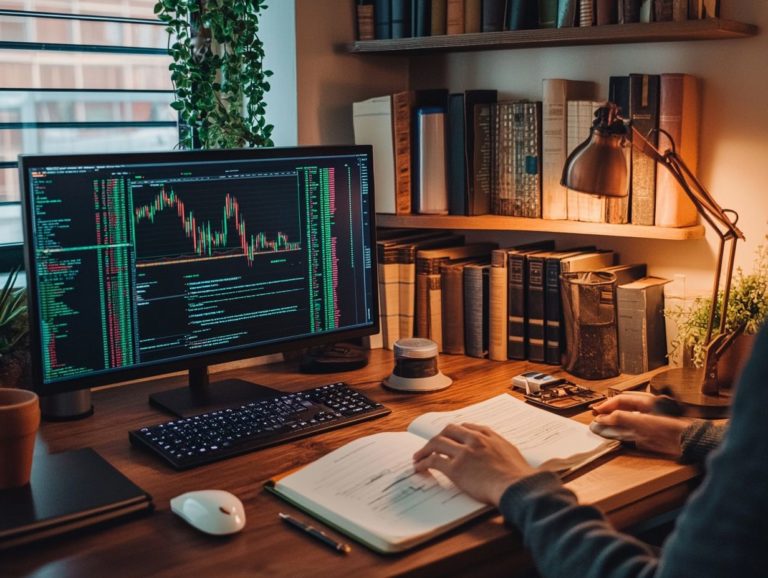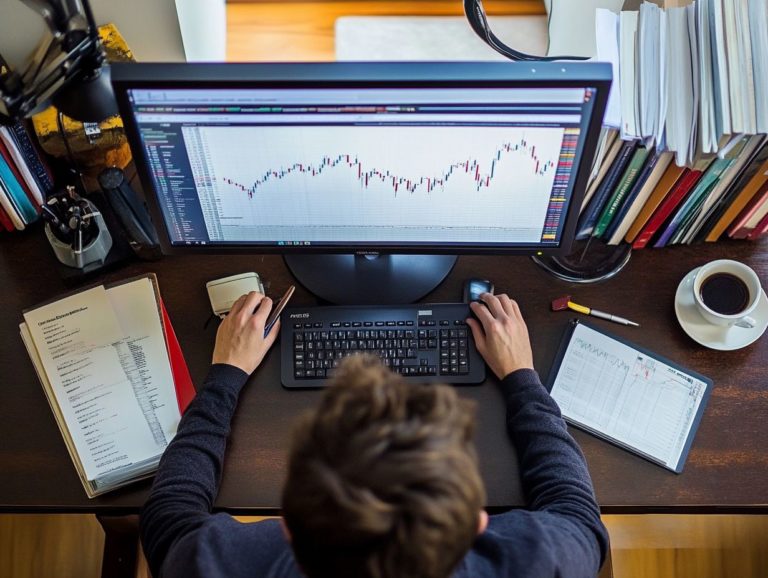The Importance of Continuous Learning in Trading
In the dynamic realm of trading, staying ahead of the curve is not just beneficial; it’s essential. Continuous learning emerges as a cornerstone for enhancing your skills and expanding your knowledge.
This article delves into the myriad benefits of ongoing education in trading. It sheds light on the perils of stagnation and the risks associated with failing to adapt.
You ll uncover effective strategies and valuable resources for continuous learning. Understand the significance of fostering a growth mindset and learn how to seamlessly integrate new insights into your trading plans for enduring success.
Contents
- Key Takeaways:
- The Benefits of Continuous Learning in Trading
- The Dangers of Stagnation in Trading
- Ways to Continuously Learn in Trading
- The Role of Mindset in Continuous Learning
- Incorporating Continuous Learning into Trading Strategies
- Frequently Asked Questions
- What is the importance of continuous learning in trading?
- How can continuous learning help improve trading performance?
- What are some ways to engage in continuous learning as a trader?
- Why is it important for traders to stay up-to-date with current market information?
- How does continuous learning impact risk management in trading?
- What are the long-term benefits of incorporating continuous learning in trading?
Key Takeaways:

- Continuous learning is essential for traders to improve their skills and knowledge, leading to better trading outcomes.
- Stagnation in trading can have serious consequences, such as missed opportunities and financial losses, highlighting the importance of continuous learning.
- Traders can continuously learn through various resources and strategies, such as books, courses, and market analysis, to stay updated and adapt to market changes.
The Benefits of Continuous Learning in Trading
Continuous learning in trading is essential for your investment success. It equips you to adapt to ever-evolving financial trends and market conditions, highlighting the importance of discipline in trading.
By engaging in ongoing education through workshops, online courses, and mentorship programs, you can hone your trading strategies and gain a competitive edge.
This dedication to lifelong learning helps you make informed decisions. It fosters emotional resilience, enabling you to navigate market volatility with confidence.
Embracing diverse perspectives and keeping abreast of emerging technologies will further enhance your ability to meet client needs effectively. This ensures sustained professional growth and self-sufficiency in the trading landscape.
Improving Trading Skills and Knowledge
Improving your trading skills and knowledge is essential if you want to capitalize on market opportunities and manage risks effectively.
By regularly engaging in technical analysis, or the study of past market data to predict future price movements, you can gain valuable insights into price movements and trends. This enables you to make informed decisions.
Familiarizing yourself with various market indicators will help you identify potential entry and exit points. It s crucial to recognize that incorporating robust risk management strategies can significantly mitigate losses and protect your profits.
Effective diversification of your investment portfolio, setting stop-loss orders, and adhering to a disciplined trading plan are vital components that contribute to long-term success in the ever-changing financial markets.
The Dangers of Stagnation in Trading
Stagnation in your trading can lead to significant drawbacks, including missed opportunities and a heightened risk of errors. It also creates a struggle to adapt to market volatility.
Without continuous learning, you may find yourself ill-prepared to adjust your strategies. This can compromise your ability to manage the potential risk compared to the potential profit from a trade.
This stagnation can weaken your emotional resilience. It makes it challenging to bounce back from setbacks and retain a competitive edge in the ever-evolving trading landscape.
Consequences of Not Learning and Adapting

The consequences of not learning and adapting in trading can be quite severe. You may be left with outdated strategies and an inability to respond effectively to shifting market conditions.
This lack of adaptability not only results in significant financial losses where you might miss out on lucrative opportunities or stumble into costly traps but it can also take a toll on your emotional resilience.
Over time, as losses pile up, they can cultivate a mindset filled with fear and doubt. This further clouds your judgment and hampers your decision-making abilities.
This vicious cycle often leads to impulsive actions, eroding your confidence and ultimately affecting your overall trading performance.
Traders who fail to evolve may find themselves caught in a downward spiral, where each setback compounds. This leads to greater losses both financially and psychologically.
Start your journey of continuous learning today!
Ways to Continuously Learn in Trading
Leverage these opportunities to enhance your knowledge in trading. Consider exploring diverse educational resources, attending insightful workshops and seminars, enrolling in online courses, or participating in mentorship programs.
By taking advantage of these options, you can significantly cultivate innovative solutions and broaden your influence within the global trading community.
Resources and Strategies for Learning
Effective resources and strategies for your trading education include online courses, workshops, and mentorship programs.
Exploring these various learning formats allows you to gain practical insights essential for navigating the complexities of money markets. Online courses lay the foundational knowledge you need, while workshops provide hands-on experiences that reinforce those concepts.
Engaging with a mentor can significantly elevate your skill set by offering personalized guidance and real-world perspectives that are invaluable.
This mix of structured education and mentorship not only equips you with theoretical knowledge but also enables you to apply your strategies with confidence in real trading scenarios, fostering your overall growth and development in your trading journey.
The Role of Mindset in Continuous Learning
The role of mindset in your journey of continuous learning is crucial for achieving trading success. By embracing a growth mindset, you enhance your adaptability and cultivate emotional resilience when faced with challenges.
This perspective transforms setbacks into valuable opportunities for growth, enabling you to refine your strategies and confidently navigate the complexities of the money market.
Developing a Growth Mindset for Trading Success

Developing a growth mindset is crucial for achieving trading success. It helps you embrace challenges and learn from setbacks, nurturing a love for learning and viewing failures as valuable opportunities for improvement.
This means reframing negative outcomes into lessons rather than allowing them to hinder your progress. By setting specific, manageable goals and regularly reflecting on your trading experiences, you can systematically strengthen your resilience.
Surrounding yourself with a supportive community and actively seeking feedback can further enhance this mindset. Ultimately, cultivating a growth mindset leads to greater emotional resilience and significantly boosts your overall trading performance, promoting consistency and adaptability in the ever-changing market landscape.
Incorporating Continuous Learning into Trading Strategies
Incorporating continuous learning into your trading strategies is essential for mastering the ever-changing landscape of the markets. This approach allows you to refine vital elements such as the size of your trades, entry strategies, and the importance of feedback in trading growth.
Diligently maintaining trading logs and analyzing your past performance can help you pinpoint areas that need improvement and ensure your strategies align seamlessly with current market indicators.
Integrating New Knowledge and Skills into Trading Plans
Integrating new knowledge and skills into your trading plans is vital for maintaining a competitive edge in financial markets. It enables you to adapt your strategies to the ever-evolving market conditions.
By embracing ongoing education, you can uncover valuable insights that enhance your analytical abilities, allowing you to spot emerging trends and shifts in market sentiment with greater precision.
This commitment to learning sharpens your decision-making processes and instills confidence in executing trades based on well-researched strategies.
Incorporating fresh perspectives from new techniques or tools can significantly elevate your performance. Prioritizing skill enhancement and knowledge acquisition puts you in a stronger position to navigate uncertainties and seize opportunities in the dynamic trading landscape.
Frequently Asked Questions
Don’t miss out on these vital resources! If you have more questions, feel free to reach out for additional information or guidance.
What is the importance of continuous learning in trading?

The trading market is constantly evolving. New strategies and techniques are being developed. Continuous learning ensures that traders are updated on the latest trends and tools to make informed and profitable trading decisions.
How can continuous learning help improve trading performance?
By learning new skills and keeping up with market trends, traders can enhance their analytical and decision-making abilities. This leads to better trading performance and increased profits!
What are some ways to engage in continuous learning as a trader?
Traders should dive into exciting seminars, workshops, and webinars. They can also read books and articles, watch educational videos, participate in online forums, or even enroll in courses specifically designed for traders!
Why is it important for traders to stay up-to-date with current market information?
Continuous learning helps traders stay informed about economic, political, and social events that heavily influence the trading market. This knowledge allows traders to make well-informed decisions based on current market trends and news.
How does continuous learning impact risk management in trading?
By continuously learning and expanding their knowledge, traders can better assess and manage risks in the market. This approach reduces the chances of making costly mistakes and losses!
What are the long-term benefits of incorporating continuous learning in trading?
Continuous learning not only improves trading performance in the short term but also allows traders to adapt and thrive in a constantly changing market. Understanding the importance of reflection in trading results in long-term success and sustainability!






